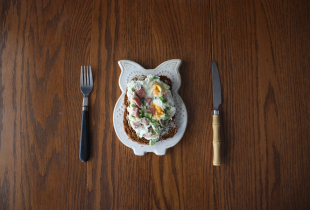By Flower Aston
Food. Does the mere mention of that word cause you anxiety? Maybe you’re hungry and start thinking, man I could really go for a fried chicken sandwich and French fries. You thought you were going to order water or a diet drink, but now that you are there, you think a milkshake would taste really good. And just as soon as you have that thought, the voice in your head continues I really shouldn’t… it’s not good for me… I’ll gain 10 pounds and I’ll never lose weight! But, you brush it off because you really want to eat it, so you shove those thoughts into the back of your mind as you shove those calories down your throat before the “logical” part of your brain can stop you. Then, the familiar feeling of disappointment comes over you. You ate so fast, it’s gone and you’d like to have enjoyed it more. You go for seconds, or you’re eying the bag of chips and go for it because you still feel hungry and you think what the heck- I’ve already ruined my diet, I might as well go for more. Instead of having a few more bites of something, you keep eating and devouring food thinking, why stop now? It’s too late. Soon, feelings of guilt start flooding in. You’re angry with yourself for “giving in,” not making the “right choice,” and eating “too much.” You continue to be down on yourself the rest of the day and continue to make “poor” choices, or alternatively you may skip a meal or two altogether in an attempt to make up for it. You look in the mirror and you feel and think you look fat. You definitely don’t look like Cameron Diaz and your butt is huge compared to Jennifer Lopez’s. You think tomorrow I’ll start over and make better food choices. However, the next day starts out much the same and you “blow it again.” And so the cycle continues.

Often you may turn to food for comfort and reward, you reach for chocolate when you are sad, chow down on some chips when you are mad, grab a hamburger when you are anxious, indulge in some ice cream when you hear some good news, snack on some cookies when you are bored, or deprive yourself of food altogether when you are feeling fat. The list goes on and on. And so food has extended its purpose. You love it and hate it at the same time. But you are not alone, and in fact these thoughts may be the norm for the majority of women and men in today’s society. But what if we could step away from this negative relationship with food and develop a positive one, one disconnected from our emotions? This is a journey that I have undertaken and during the process have earned my degree in nutrition with the title of Registered Dietitian. What I’ve learned is that it is a struggle against today’s constant negative messages about self-worth and the connections to body image. But it is doable, and it results in a body weight that is healthy for you-not some skinny model or movie star that has been edited and airbrushed past the point they recognize themselves.
It’s about eating when you are hungry and stopping when you are full. It’s paying attention to your food. Turn off the T.V., stop staring at your phone and acknowledge every bite. Chew your food instead of wolfing it down. Enjoy the flavors in your mouth and really smell and taste what you are eating. When you do this, you gain satisfaction and feel like you have actually eaten. It also causes you to slow down and allow time for your stomach to signal to your brain that you are actually full. A positive food relationship is also about making good choices, but not all the time, and feeling good about the choices you do make.
When you feel the urge to eat, think about why you want to eat. Is it because you truly feel hunger? Or is it because you are stressed about that paper that’s due, or just had an argument with someone? If you are truly hungry, then listen to your body and eat. If not, what is it that is causing you to want to eat? Whether you identify the cause or not, try and do something else to comfort yourself, relieve stress, and divert the urge to emotionally eat. Try losing yourself in a good book, going for a walk, calling a friend, taking a bath, weeding your garden, playing with your kids, sitting with your feelings and acknowledge them, and/or facing the problem or situation. You may find journaling helpful to identify what is causing your urge to eat when it’s not actual hunger. This can help you better understand yourself and help you to think twice before you reach for something when you aren’t actually hungry.

Sometimes you are going to make a choice to eat even if you aren’t hungry because that candy bar just sounds really good right now and it’s not because you have other stressors, it’s just because you are “craving” it. And that’s okay too. Just don’t beat yourself up about it because that’s when you start feeling badly about your food choices and yourself. Instead, fully enjoy eating the candy bar, get satisfaction out of eating it, and then move on with your day. In the long run that candy bar didn’t add much to your calorie intake, it’s when you feel bad about eating it and continue to eat because you “blew it,” or you just feel bad and don’t care anymore. That’s really where all the extra calories come in to play and that’s when you have a negative relationship with food.
There are the times when we deprive ourselves of food. You might feel like you are busting out of your jeans and your muffin top is spilling over, so you start starving yourself thinking that if you could just skip some meals you could lose the weight. You are now using deprivation of food to punish and torture yourself. You are denying your body of its natural right to have nourishment, and you may skip a meal here or there or consecutively and then “give in” and eat. But instead of making good choices you are more likely to make less nutritious choices than if you would have just eaten in the first place and you are more likely to overeat. This cycle tends to repeat itself. Restriction sabotages you further because your body’s metabolism tends to go awry and may actually slow down and cause you to retain weight easier. Instead of repeating these patterns, it’s best to stop yourself when you start having negative thoughts about your body and realize that depriving it of food will only intensify the situation, fostering that negative relationship with food. Instead, make a choice to eat, and eat nutritiously to nurture your body. Loving your body and providing it with what it needs will help you to develop a positive relationship with food, and developing a positive relationship with food will help you love your body.

So maybe that fried chicken sandwich isn’t the best choice, but you made the choice to eat and you will fully enjoy it. You don’t feel guilty so you will probably actually stop eating when you are full and will be less prone to thinking “you blew it.” You don’t feel the urge to continue making “bad” food choices now or starve yourself because you realize you didn’t “blow it.” You enjoy your lunch giving it the attention it deserves and then you move on with your day, weeks, months, years, and over time with a reasonably active lifestyle, your body settles into a weight that is healthy for you. You might not be aspiring to be America’s Next Top Model, but you’re also not obsessed with how you look in the mirror all the time either. You are comfortable in your own skin and food is no longer your best friend or your enemy, it’s simply food.



